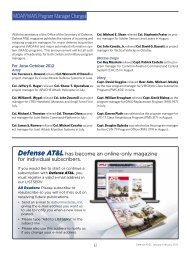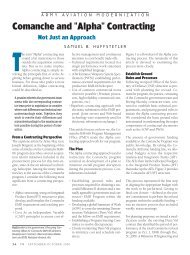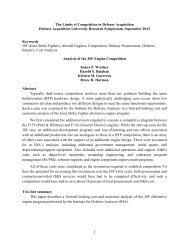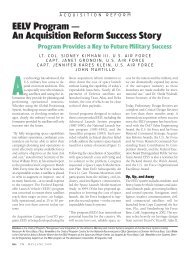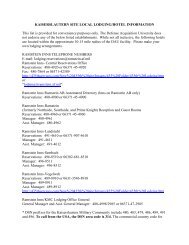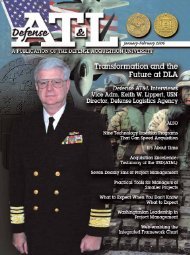Defense ARJ - Defense Acquisition University
Defense ARJ - Defense Acquisition University
Defense ARJ - Defense Acquisition University
Create successful ePaper yourself
Turn your PDF publications into a flip-book with our unique Google optimized e-Paper software.
<strong>Defense</strong> <strong>Acquisition</strong> Review Journal<br />
172<br />
endnotes<br />
1. The ontological and epistemological position that does not assume reality is<br />
an objective experience. In this article, the author assumes reality is socially<br />
constructed (Berger & Luckmann, 1967; Searle, 1995).<br />
2. In philosophical terms, the author refers to the “tools of epistemology and<br />
ontology” that Weick describes sensemakers using as “they create that which they<br />
interpret” (1995, p. 38).<br />
3. Rutgers (1999) states, “In the course of the nineteenth century the idea of<br />
rationality became almost exclusively connected with science and technology,<br />
and emerged as the methodological determinant for objectivity and expertise.<br />
In fact, science became regarded as the paradigm of rationality. The scientific<br />
method of positivism constitutes the strongest expression of the belief in<br />
scientific rationality. The founding positivist, Comte (1798–1857), believed that<br />
empirical scientific research can not only improve the world by making better<br />
humans, but would enable them to control the ravages of nature. Positivism<br />
is premised on the idea that rational, scientific thought can solve all human<br />
problems and that there is a steady progress of science and society. As a research<br />
method, positivism goes hand in glove with empiricism—the belief that certain<br />
knowledge can only be arrived at by means of observation (ironically, contrary<br />
to rationalism). Positivists believed that it was a means to arrive at objective<br />
knowledge. Thus, not only is metaphysical argument debased as ‘subjective,’ but<br />
all value issues ought also to be regarded as unscientific and thereby out of the<br />
sphere of rationality” (pp. 22–23).<br />
4. What seemingly makes technical rationality a legitimate paradigm in the minds<br />
of PPBE sensemakers is what sociologist Max Weber calls Zweckrational or<br />
a process of linear reasoning believed to establish clear means-ends linkages.<br />
“If you do X, then Y will happen as a result” This perceived and believed to<br />
be irrefutable legitimacy stems from five sub-beliefs: that an established legal<br />
code can claim obedience from members; that law is a system of abstract rules<br />
that are applied to particular cases (and that application looks after the interest<br />
of the organization within the limits of law); that the person who exercises this<br />
authority should obey in an impersonal manner; that only in the capacity of being<br />
a member is there reason to obey the law; and that this obedience is not attributed<br />
to a specific person, but the position that they occupy. In short, technical<br />
rationality is what Weber conveys as the dominant philosophy of the archetypal<br />
bureaucrat (Heydebrand, 1999).<br />
5. These reflect a synthesis of political reasoning from the works of Machiavelli<br />
(1961/1532); Allison (1969); Kingdon (1995); Stone (1997); and Zahariadis<br />
(1998).



